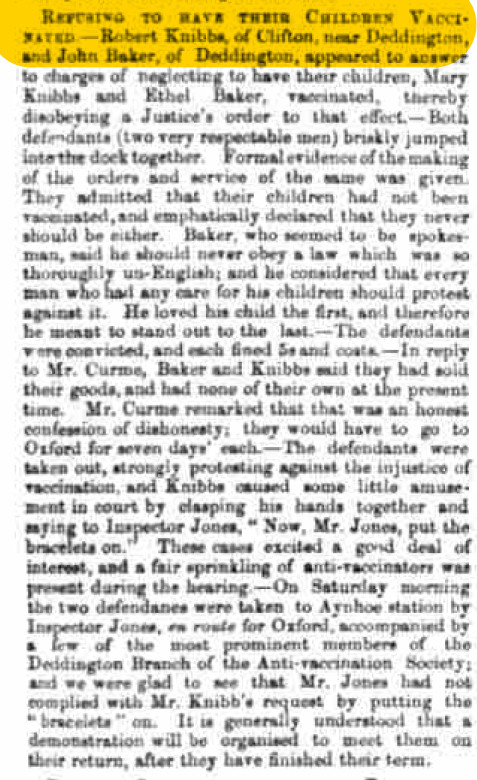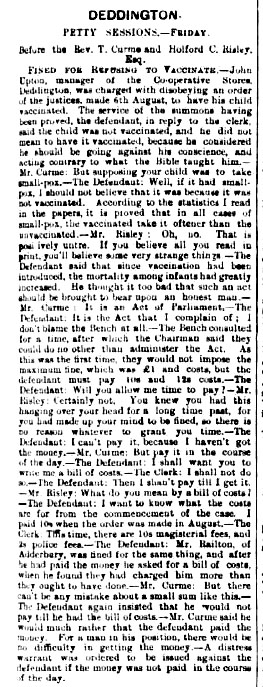Millennium Project
Rob Forsyth & John Plumbe
History has a habit of repeating itself. A regular topic of comment during the Covid-19 pandemic has been the issue of those who are resisting or opposing vaccination. It was also a topic of considerable comment in Deddington in the C19th as this article shows.
Joseph Edward Malings (1836-86)
Joseph was a member of a long time (200 years +) farming family. He became deeply involved in alternative medicine, religion and the rights of parents, as well as sub-prime mortgages and negative equity – an altogether recognisable man today! He described himself as ‘Chemist, Druggist & Botanic Practitioner’.
It was his opposition to the Vaccination Acts of 1867 & 1871 that drew him to very public attention. The Acts made it unlawful for children not to be vaccinated within 3 months of birth. While making known his views on the infringement of parental rights, Joseph also expressed his doubts on the efficacy of vaccination and his determination to resist the requirements of the Acts “by all lawful and reasonable means.” He posed the question: “We ought to know why the Government should seek (contrary to our natural instincts) to deprive us of our parental authority, and what right the State had to compel parents, nolens, volens, (sic) under threat of fine and imprisonment to have their children vaccinated.”
It all sounds very familiar today. He had begun his opposition while living in Sydenham when he refused to have his second child vaccinated. He duly received a Court Summons and his case was heard before a Stipendiary Magistrate at Greenwich, where he was fined ten shillings and ordered to pay costs of two shillings. In 1872, now living in Deddington, his third child was due to be vaccinated but he refused to comply with the order from the Woodstock Board of Guardians, and as a consequence received a Summons to appear before the Magistrates sitting at Deddington on 25 July. The day before the court case the Medical Officer from the Woodstock Union “intruded himself in my house in my absence, to examine the Child…”, this power of entry having been granted under the Act. In Court he was fined ten shillings and ordered to pay costs of twelve shillings and sixpence.
A week later he received a letter from the Court notifying him that there were additional costs to pay amounting to one pound fourteen shillings and sixpence, of which the Union Surgeon’s fee was £1.1s, the certificate 3s 7d. and “hire of horse” 9s. 8d.
Joseph was thoroughly provoked by these supplementary charges as they had not been imposed by the Magistrates at the time of the case in Court, so he refused to pay and expressed his view very strongly in a letter to The Banbury Advertiser (left) on 11 September 1873. Click on image to enlarge
Despite public support from Jackson’s Oxford Journal amongst others, he was sentenced to 7 days in prison - subsequently avoided by a stay of execution – but “my goods were at once seized and removed to my great astonishment, inconvenience and annoyance.”
He carried on to publish a pamphlet, Narrative of Three Prosecutions under the Vaccination Act. This work was offered for sale in green printed wrappers for twopence, or in a “Cheap Edition of the same for the poor,” without wrappers, for one penny.
All this - and much more about this remarkable man and his medical practice in particular - can be found in an extensive article written by his direct descendant, Jon Malings, who was a valued History website sub editor for several years writing about his family and many other topics.
John Upton
John Upton, manager of the Co-operative Stores, was another anti-vaxxer. In 1875 he also refused vaccination for his child. In the course of the trial he asserted that statistics showed that vaccination against small pox had increased infant mortality. To which Mr Holford Risley (son of the deceased Rev. Risley) presiding on the bench, robustly responded " On No. That is positively untrue. If you believe everything you read in print, you'll believe some very strange things."
When he was fined by Mr Risley he argued and cheekily demanded that he be given a full accounting of why the fine was so big. To which the other JP on the Bench that day (Rev Curme) responded that he could well afford to pay and to stop arguing otherwise a distress warrant for recovery by the bailiffs would be issued. He paid.click on image (l) to enlarge
Anti and pro-vaccinators clash in Deddington Market
 The Banbury Advertiser of15 June 1876 carried an article about Robert Knibbs of Clifton and John Baker of Deddington being charged with failing to vaccinate their children Mary & Ethel. They admitted the charges and Baker, 'who seemed to be spokesman, said he would never obey a law which was so thoroughly un-English'. They were fined but could not pay because they had 'sold all their goods and had none of their own at the present time. Mr Curme* remarked that that was an honest confession of dishonesty; they would have to go to Oxford for seven days each'.(Ed: *Rev Curme on the bench)
The Banbury Advertiser of15 June 1876 carried an article about Robert Knibbs of Clifton and John Baker of Deddington being charged with failing to vaccinate their children Mary & Ethel. They admitted the charges and Baker, 'who seemed to be spokesman, said he would never obey a law which was so thoroughly un-English'. They were fined but could not pay because they had 'sold all their goods and had none of their own at the present time. Mr Curme* remarked that that was an honest confession of dishonesty; they would have to go to Oxford for seven days each'.(Ed: *Rev Curme on the bench)
Click on the image (l) to read the full article
The quite dramatic and amusing story carries on after their release from prison.If you wish to download and read the somewhat faded original text click HERE (pdf) but it may be easier to read the transcription (inc. idiosyncratic punctuation) below.
Their efforts were rewarded when, in1898, the vaccination law was amended to allow for exemption based on conscience. This is where the phrase 'conscientious objector' originates.
More newspaper articles
From 1872 onwards there are numerous references to anti-vaccinators and their activities. Some articles have been reproduced above but the pages from which they are taken and more can be found in our Google Drive archive. The articles are highlit for ease of finding them amongst the densely packed text.

